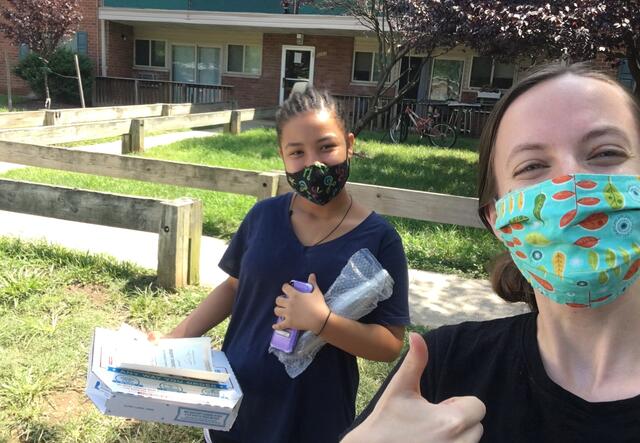By Hailee Pipes, IRC Youth Services Coordinator
On Friday August 7th, refugee students, volunteers and staff met on Zoom to celebrate the end of the five week long Virtual Summer Youth Academy. Students were prepared with their certificate of completion in-hand and their own personal pizza to enjoy, both previously delivered to students’ households by IRC staff. Celebratory music played in the background of the Zoom call as students took turns proudly holding up their certificates as volunteers and staff cheered each one on. This moment marked the end of the third annual Summer Youth Academy, although this was unlike any other past summer academy at the IRC.
Since the beginning of the summer, the youth team’s goal was to provide refugee students with a program to meet their social, academic and emotional needs amidst the coronavirus pandemic while ensuring the safety and health of all students, staff and volunteers. Staff reached out to students and families to gauge interest in an online program and to better understand whether or not this type of program would be feasible and beneficial for the students and families. The response from students and families was overwhelmingly in favor of participating in a program that would give students the opportunity to continue learning, improve their digital literacy and give them something meaningful to engage in over the summer.
A new program, the Virtual Summer Youth Academy, took the place of the traditional in-person summer program and allowed students to participate in online sessions from the safety and comfort of their own home. The youth team set out to prepare lessons, enroll students, train volunteers, order supplies and reach out to community partners for support. By the first day of the Virtual Summer Youth Academy, 60 middle and high school students were enrolled, 27 volunteers were trained and 5 community partners were enlisted to contribute. The 5-week program was designed with 4 days of online Zoom sessions per week. Each day consisted of two extracurricular sessions, one English session and one math session. Math and English sessions were split into three levels of difficulty, with students placed in their respective level by the youth team. Students worked with a trained volunteer and a small group of peers to develop their skills and increase their understanding in the respective subject area. Extracurricular sessions were aimed to broaden students' horizons through a variety of topics and areas, such as: gardening, nutrition, soccer, dance, capoeira, arts and crafts, business, music, STEM, social justice, climate change and more.
Although students were unable to gather in-person for teaching and instruction, the youth team felt it was vital to provide students with materials to ensure hands-on learning during the live Zoom sessions could be achieved. Weekly kits were curated by the youth team to include supplies for students to be used during the upcoming week of Zoom sessions. Each week the kits were delivered to students' households in a socially distanced and secure manner by IRC staff. Over the course of the five week program a total of 300 kits were delivered to 60 students to enhance their online learning experience. The final delivery which was to be used for the end-of-summer celebration, consisted of each student’s certificate of completion, a reusable water bottle and a pizza.
To mark the end of an unforgettable summer, students, volunteers and the youth team joined a final Zoom session and shared their favorite memories from the Virtual Summer Youth Academy. Students expressed their gratitude to the volunteers, staff and each other for a positive and meaningful summer experience. Staff and volunteers ensured students that this was not goodbye and that the beginning of distance learning this fall would open up new challenges and opportunities for us to see each other, learn and make new memories together. The IRC youth team is prepared to respond to any challenge that might come up and ensure refugee students know they are supported and loved by their community.
